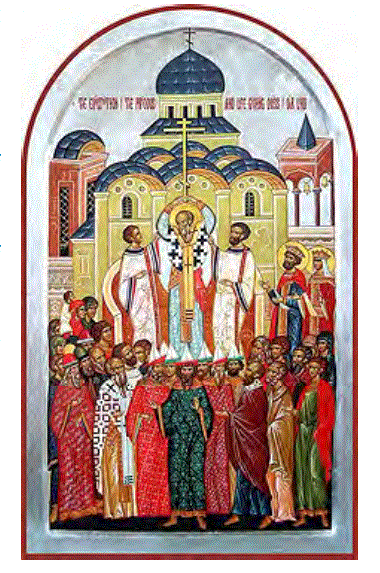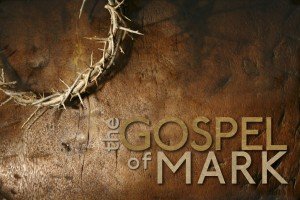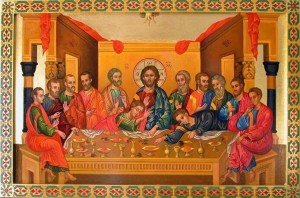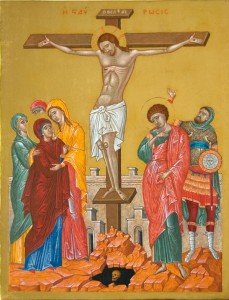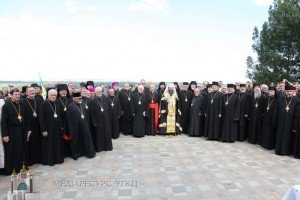 Be not afraid nor be troubled, for the Lord your God is with you wherever you will go (Joshua 1:9)
Be not afraid nor be troubled, for the Lord your God is with you wherever you will go (Joshua 1:9)
Dear Brothers and Sisters in Christ,
For almost a year, our entire nation has been on a pilgrimage to authentic freedom. After having gone through a liberating experience with the revolution of dignity, we then endured a tragic armed conflict, the annexation of Crimea, and military incursion into Eastern Ukraine by a neighboring country. We are living through a difficult economic crisis and are constantly facing challenges in the political sphere. How can we be certain that God is with us?
Under Moses’ guidance, for 40 years the People of Israel made their pilgrimage, their passing over from slavery to freedom, from death to life, from a house of slavery to the Promised Land. How much uncertainty and fear did that people suffer in choosing to follow God’s call; how much doubt did Moses himself have to suffer because the Lord entrusted him to lead the people on this journey! The Almighty gave Moses signs of His support and presence: the facility to pray and to hear God; the Ark of the Covenant containing the stone Tablets of the Law, which taught truth and justice; the flowering Rod of Aaron that demonstrated God’s loving protection over his chosen ones. We know that the People of Israel accomplished this journey and took possession of the Promised Land.
This Old Testament story is not just a reminder but a prophecy, a sign, and a promise to us that God is with us. Then, He guided the Israelites through the desert and now He accompanies our Church and the Ukrainian People through all our present-day trials. He helps us to overcome fear and uncertainty. We also have been given signs of God’s support: the prayer during the Maidan, which triumphed over force; the land that God gave us, which nourishes and sustains life; God’s own Commandments, which teach us how to live; the martyrdom of the righteous and of our heroes who gave witness in the distant and recent past, and also witness today to the strength of our nation’s spirit and purify it with their sacrifices. No matter the grief, fear, and calamity, we know that the Lord is with us.
Our pilgrimage is a time of trials, but at the same time an opportunity for consolidation and unification. In our church hymns we pray: “God, grant us unity.” At this moment we see the incredible strength found in united efforts: in the work of volunteers, in mobilizing the population, in generous donations for the army’s needs, in the assistance to those forced to flee from Crimea and the East. These are all works of mercy and it is precisely these deeds that bring down upon us Heaven’s blessing. We must unite not only though grief, danger, fear, but in understanding our common destiny and our common future.
We urge everyone to continue to persevere in walking along the way of truth and freedom, daily building up our future with fervent prayer, solidarity with the suffering and the needy, in supporting all government and community initiatives for defending our Motherland, and strengthening God’s saving Law in our nation. We bow our heads before all the heroes who gave their lives for the freedom and independence of our country, for the dignity of every Ukrainian and every European. We express our sincerest condolences to their families, as well as to the friends and families of all those killed during the war in Eastern Ukraine. We address a special word of recognition to all who today, with remarkable and dignified sacrifice, stand guard at the front of our common freedom, and we thank those who, with their generosity and personal sacrifice, testify to God’s Truth in a time of war and great moral challenges.
We express our closeness to the families of the wounded, to those deprived of shelter and exposed to all kinds of dangers. We promise them prayerful support and encourage all priests to increase pastoral solidarity with all who suffer. We encourage all the faithful of the UGCC and all people of good will in Ukraine and in the international community to increase their common efforts to reduce suffering and provide spiritual and physical healing to the wounds of Ukrainians. We urge all who will hear us, to engage in concrete works of Christian mercy. We are not condemned by circumstances; we can and must act!
Before us lie Ukrainian parliamentary elections. Because of the radicalness of the transition, these elections are the most complex and important ones in the history of independent Ukraine. This is why we need unity today, not unity around political figures but around a common understanding of our future. The past winter showed us all how much we need an honest and independent parliament, and how important the choice of each deputy is and what huge price we pay for their dishonesty and mistakes.
In our present day, the political system depends on us because the Lord God, Who is the source of authority, has entrusted it to the people, and that is why it is our responsibility to bring fair and wise politicians to power. Perhaps each person separately does not have much impact on politicians or the situation. Be assured, however, that even one vote, one fair choice, can be crucial at the local level and facilitate common, correct decisions throughout the country. Let us not leave our responsibilities to others. Let us make our choice wisely and honestly.
In such an uncertain time, it is easy to be tempted by populist slogans that give rise to panic and promote empty criticism. Criticism can be constructive only when its goal is the common good. Constructive criticism promotes unity when it distinguishes itself from empty criticism [or: recrimination] and politicking. Do not believe those who promise instant resolutions to solve all problems. The political and economic crisis, and especially war, demonstrated that our country suffers from numerous weaknesses in many areas. In order to establish life and growth – which the Ukrainian people, who endured the Maidan, justly demand – we need profound and sustained reform that will certainly be painful and long-lasting, and which can only be implemented through the wisdom and courage of those engaged in the political sphere and through the unity of the nation.
As already mentioned, it is vital that causes of our internal problems be identified: we all observe the bleeding ulcers of corruption, avarice, moral double standards, and impunity for those in government who abused power. These are primarily spiritual wounds; thus let us find healing for them in the Spirit.
We call upon our politicians, those in office and those to-be elected. You are coming to power in an incredibly difficult time. Now it is not the time to enjoy the benefits that you have acquired – now is the time for sacrifice. The power entrusted to you involves primarily responsibility before the people who trusted you. May the sacrifice of the Maidan’s Heavenly Hundred be always before you, as well as the thousands of fallen Ukrainian soldiers and civilians in the East. May their sacrifice become the measure of your every decision.
We entrusted ourselves to God and travelled along the pilgrim’s path to dignity and freedom. This will be a long pilgrimage, and not everyone will witness its successful conclusion. Moses was chosen by God and yet he did not reach the end. And neither did Patriarch Josyf, who brought us forth from the house of slavery. Only Metropolitan Andrey saw it, and then only in a vision granted him before death. The Heroes of the Heavenly Hundred did not see it. But all these just mentioned have one thing in common: they led and endured to the end and then passed the torch to us. We must remain loyal to their guidance!
Much uncertainty lies before us: we do not know where our journey will lead us and how many sacrifices it will require, how many soldiers of light will be necessary to deliver us out of darkness. We do not have the answers to many of these questions. No one does. Only the Lord has the answers, and He says: “Fear not! Go forth! I will be with you!” In this we can be certain. And so, let us go forward with God!
The blessing of the Lord be upon you!
In the name of the Synod of Bishops of the Ukrainian Greek-Catholic Church
+ SVIATOSLAV
![]() I have been sharing in this article what the Eastern Fathers taught about the idea of the Original Fall, especially as it is connected with the Mystery of Baptism. They maintained that the fall resulted in human mortality and not the inheritance of sin. Thus, the Eastern Church baptizes children, not to remit their yet non-existent sins, but in order to give them a new and immortal life, which their mortal parents are unable to communicate to them. The opposition between the two Adams (i.e., Christ and the first man) is seen in terms not of guilt and forgiveness but death and life. The first man was from the earth, a man of dust; the second man is from heaven; as was the man of dust, so are those who are of the dust, and as is the man of heaven, so are those who are of heaven. Baptism is the paschal mystery, the passage. All its ancient forms, and especially the Byzantine, include a renunciation of Satan, a triple immersion as type of death and resurrection, and the positive gift of new life through anointing and Eucharistic communion.
I have been sharing in this article what the Eastern Fathers taught about the idea of the Original Fall, especially as it is connected with the Mystery of Baptism. They maintained that the fall resulted in human mortality and not the inheritance of sin. Thus, the Eastern Church baptizes children, not to remit their yet non-existent sins, but in order to give them a new and immortal life, which their mortal parents are unable to communicate to them. The opposition between the two Adams (i.e., Christ and the first man) is seen in terms not of guilt and forgiveness but death and life. The first man was from the earth, a man of dust; the second man is from heaven; as was the man of dust, so are those who are of the dust, and as is the man of heaven, so are those who are of heaven. Baptism is the paschal mystery, the passage. All its ancient forms, and especially the Byzantine, include a renunciation of Satan, a triple immersion as type of death and resurrection, and the positive gift of new life through anointing and Eucharistic communion.
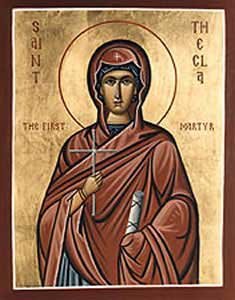 THECLA – was born in Konya Turkey in the early part of the first century. She was baptized by Paul. She lived a solitary life. During the reign of Emperor Nero she was accused of being a Christian and thrown to the lions in the local amphitheater. The lions refused to harm her. Later she was thrown into a burning pyre from which she escaped unscathed because the fire burned out as soon as she was put into it. At this obvious miraculous turn of events, she was let go.
THECLA – was born in Konya Turkey in the early part of the first century. She was baptized by Paul. She lived a solitary life. During the reign of Emperor Nero she was accused of being a Christian and thrown to the lions in the local amphitheater. The lions refused to harm her. Later she was thrown into a burning pyre from which she escaped unscathed because the fire burned out as soon as she was put into it. At this obvious miraculous turn of events, she was let go. Be not afraid nor be troubled, for the Lord your God is with you wherever you will go (Joshua 1:9)
Be not afraid nor be troubled, for the Lord your God is with you wherever you will go (Joshua 1:9) 